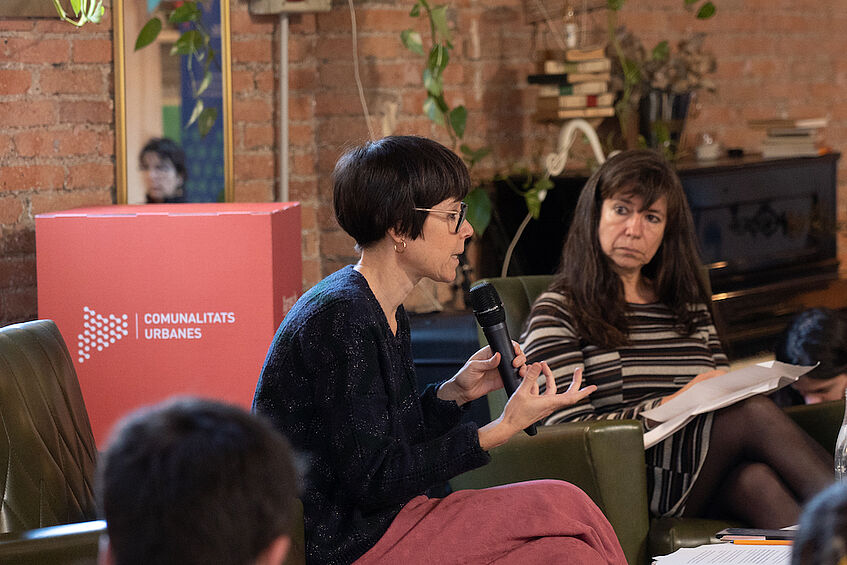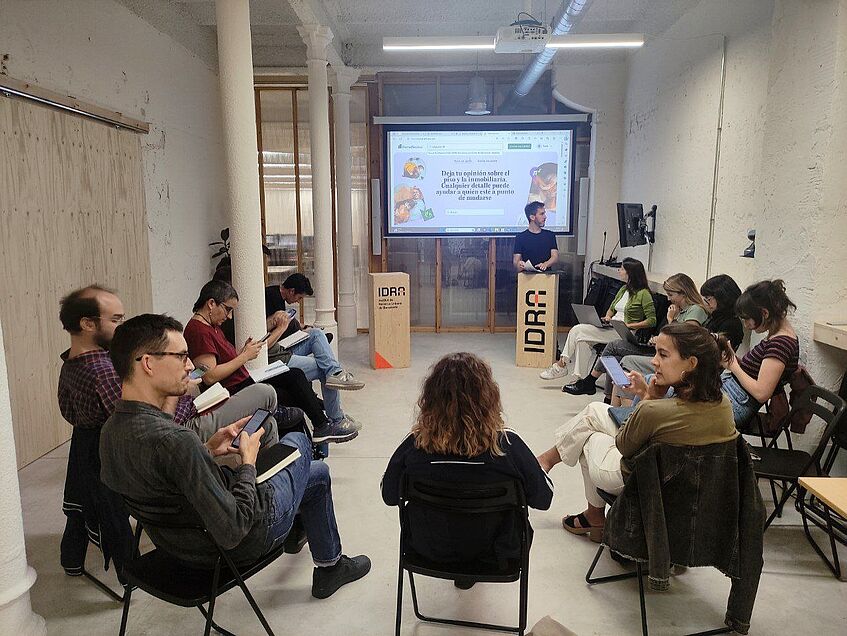Barcelona
Case: Comunalitats Urbanes and the Reviu portal

Laia Forné, co-founder of the La Hidra cooperative, and Yayo Herrero at a Comunalitats Urbanes meeting.
In Barcelona like elsewhere, while the public sector has been withdrawing from social service provision in the realms of housing, workforce development, health, and even income and in-kind assistance, community is implicitly, and sometimes explicitly, expected to fill the gaps left as the state retreats. At the same time, Barcelona has been developing new forms of public management through citizen participation in the form of bodies, processes, debates and consultations. A participative governance arose in response to the neighbourhood movement and the demand for more citizen involvement, but it has turned into an oversized and complex, extremely bureaucratic architecture. Comunalitats Urbanes (2022-2024) or “Urban Commonalities” is a public policy program of the Department of Economy and Labor of the Catalan regional government. Its main objective is to boost local economies in neighborhoods and cities, giving impetus to new mutual support projects. The program aims at creating these projects from the perspective of the right to the city, common goods and the social and solidarity economy. With the creation of 22 Comunalitats throughout the Catalan territory being approved, each Comunalitat receives €250,000 over two years to develop its activity.
In contemporary metropolises, one of the biggest yet unattended problems of the housing market is its information asymmetries. Technically a form of market failure, it corresponds to the opposite of what ideal market models look like in textbooks. In a global city like Barcelona, information about the housing supply is mostly shaped and provided by those that manage the supply, i.e. real estate brokers and to a lesser extent landlords. Reviu is a bottom-up process of participation which emerges both from a need expressed by tenants and by an interest from actors close to the administration. Like the Comunalitats, it is a paradigmatic municipalist experiment aiming at democratizing the city by exploring a public-community alliance based on a collaboration between a citizen initiative and municipal institutions. While the case study will have in the neighborhoods of Sants and Eixample its hotspots (where community work will be done to make the portal grow), its online nature endows it with the potential to grow at city-wide level.
Urban Living Labs in Sants
Developing reciprocity metrics
The first living lab has been co-designing and co-producing different meetings and workshops in Sants with 22 civil society organizations and activist networks -including cooperation partner Coopolis-, neighborhood inhabitants, and key members of the local and regional government. This has been done in the context of a public policy program of the Catalan regional government known as Comunalitats Urbanes (2022-2024) or “Urban Commonalities”. The main aim of this process has been to develop new indicators and metrics that allow both neighborhood communities and the local state to evaluate practices of mutual support and reciprocity, thus promoting a public-communitarian partnership
Addressing housing transparency

Jaime Palomera and the Advisory Board at the Reviu living lab organized at IDRA.
Addressing housing transparency
After an initial diagnosis, the research team found it necessary to launch this second living lab specifically centered around the promotion of public-communitarian partnerships in the sphere of housing. Regular meetings have been held with neighborhood inhabitants, civil society organizations, software developers and key members of the municipality (Sants and Citizen Participation Department, and Housing Department), to co-create an online housing portal: a cooperative start-up initiative that seeks to tackle the housing crisis by reducing democratic deficits and asymmetries produced by the market, and fostering reciprocity, transparency and well-being among residents.
